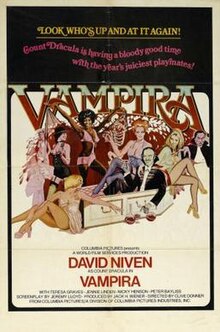Vampira (1974 film)
 From Wikipedia the free encyclopedia
From Wikipedia the free encyclopedia
| Vampira | |
|---|---|
 Theatrical release poster | |
| Directed by | Clive Donner |
| Written by | Jeremy Lloyd |
| Produced by | Jack Wiener |
| Starring | |
| Cinematography | Anthony B. Richmond |
| Edited by | Bill Butler |
| Music by | David Whitaker |
Production company | World Film Services |
| Distributed by | Columbia-Warner Distributors |
Release date |
|
Running time | 88 minutes |
| Country | United Kingdom |
| Language | English |
Vampira is a 1974 British comedy horror film directed by Clive Donner, and starring David Niven and Teresa Graves.[1] This spoof of the vampire genre was re-titled Old Dracula for release in the United States,[2] in an attempt to ride the success of Young Frankenstein.
In the film, Count Dracula is facing the problems of old age. His attempts to resurrect a female vampire from his past turn her into a black woman. She in turn changes him into a black man. The vampire couple travel to Rio de Janeiro at the end of the film.
Plot
[edit]Count Dracula is an old vampire who, because of his advanced age, is forced to host tours of his castle to get new victims. In an attempt to revive his long-lost love, Vampira, Dracula needs to find a victim with a very specific blood group combination to resurrect Vampira by a blood transfusion. So he sets out to collect blood from the bevy of Playboy Playmates visiting his castle. However, one of the Playmates whose blood is drained is black, turning the revived Vampira into a black woman.
Dracula enthralls the hapless Marc to collect blood from three white women in hopes of restoring Vampira's original skin color. Dracula transfuses the blood into her but she is unchanged; however, her bite turns Dracula black. Marc and his love Angela race to destroy Dracula but are taken aback upon seeing Dracula's new skin tone. Their surprise gives the vampires time to slip away to catch a flight to Rio de Janeiro for Carnival.
Cast
[edit]- David Niven as Count Dracula
- Teresa Graves as Countess Vampira
- Nicky Henson as Marc
- Jennie Linden as Angela
- Linda Hayden as Helga
- Bernard Bresslaw as Pottinger
- Andrea Allan as Eve
- Veronica Carlson as Ritva
- Minah Bird as Rose
- Freddie Jones as Gilmore
- Chris Sandford as Milton
- Frank Thornton as Mr. King
- Peter Bayliss as Maltravers
- Cathie Shirriff as Nancy
- Aimi MacDonald as Woman in hotel room
- Patrick Newell as Man in hotel room
- Kenneth Cranham as Paddy, the Delinquent
- Carol Cleveland as Jane, the Delinquent's Victim
- Luan Peters as Pottinger's Secretary
- Nadim Sawalha as Airline Representative
- Marcia Fox as Air Hostess
- Penny Irving as Playboy Bunny
- Hoima McDonald as Playboy Bunny
- Nicola Austin as Playboy Bunny
- David Rowlands as Drunk
- Ben Aris as Policeman
Release
[edit]The film was released theatrically in the United States by American International Pictures in 1975, under the title Old Dracula in an attempt to cash in on the success of director Mel Brooks 1974 horror movie spoof Young Frankenstein. Exhibitors frequently paired Old Dracula on a double bill with Young Frankenstein.[3]
Critical reception
[edit]The Monthly Film Bulletin wrote: "Jeremy Lloyd has constructed an entire screenplay on one-line jokes with a vampire theme, with a series of witless and repetitive gags. ... The other joke format is based on the fact that Vampira is black, with her lines including such gems as her reminiscence of dancing in the Twenties: "Do you remember the big apple, the charleston, my black bottom"; like the whole concept of there being something disturbing about being black, they strike a very sour note. ... As for the performances, Teresa Graves is very beautiful, Peter Bayliss provides amusement by overplaying in a desperate attempt to save the script and, much to his credit, almost succeeds, while Mr. Niven proves that even suavity cannot excuse the indignity of being blacked up."[4]
Roger Ebert, writing for the Chicago Sun-Times, gave the film one out of four stars, describing it as a mess with only Niven being a highlight, describing the film as a "depressing exercise" due to not being to the standard of British horror films of the time and feeling dated to the previous decade.[5]
Trivia
[edit]In the opening scene, David Niven flips through the July 1973 issue of US Playboy Magazine.[6]
References
[edit]- ^ "Vampira". British Film Institute Collections Search. Retrieved 23 February 2024.
- ^ Bacon, Simon (10 October 2022). Spoofing the Vampire: Essays on Bloodsucking Comedy. McFarland. ISBN 978-1-4766-4739-5.
- ^ Smith, Gary A. (6 February 2017). Vampire Films of the 1970s: Dracula to Blacula and Every Fang Between. McFarland. ISBN 978-1-4766-2559-1.
- ^ "Vampira". The Monthly Film Bulletin. 41 (480): 257. 1 January 1974. ProQuest 1305831536 – via ProQuest.
- ^ Ebert, Roger (15 December 1975). "Old Dracula movie review & film summary (1975)". RogerEbert.com. Retrieved 14 June 2018.
- ^ Garrett, Gerard (1975). The Films of David Niven. LSP Books. ISBN 978-0-85321-066-5.
External links
[edit]